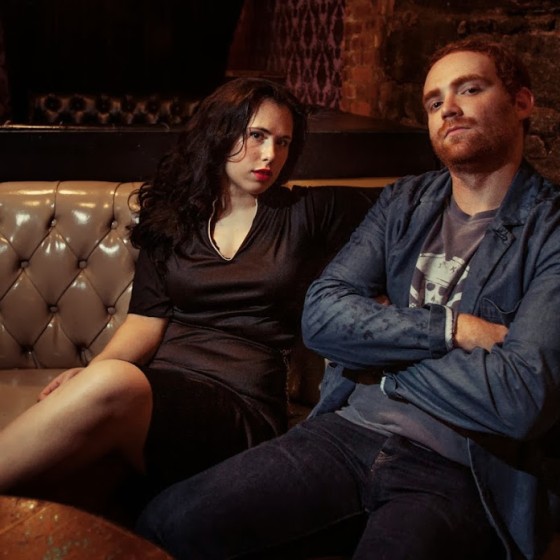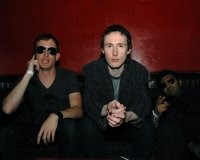In an exclusive interview, The Brooklyn-based band, The Humble Grapes, talks about how they got their band name, the musically-saturated NYC area, and musical production.
[ indiessance ]
What does the phrase humble grapes mean to you? How did the band's name come about? Also, how did The Humble Grapes develop into its current lineup? David and Brie, could you also describe your musical backgrounds?
[ David ]
The Humble Grapes is a name we came up with after spending about 4 months with the name The Big Deal. That didn't work. The Humble Grapes came from a lot of think tank hours where we tossed around so many different ideas. The idea behind The Humble Grapes is that its the translation of the Hebrew homonym for the word ah-nav. One spelling of the word means humble. The other spelling means grape. We thought there was something to that. We came up with the idea that we (Brie and I) produce the best under pressure, similar to a grape producing the best (fine wine) when squeezed.
The Humble Grapes are Brie and I. The musicians and other people involved are terrific people we've met along the way who help us in unique ways depending on the project.
My musical background- Classically trained pianist from 8-13 yrs old. Then I discovered the Beatles and that was that for classical piano but that education has totally helped me be the musician I am today. Have been playing in bands in NYC since I'm 16. I went to Berklee College of Music (which is where I met Brie) and studied songwriting, film scoring, and piano. That experience was invaluable as I was afforded the ability to eat, breathe, and sleep music for almost 3 years.
[ Brie ]
We were trying to come up with a name for the band after starting. We had been calling ourselves the big deal which as Dave likes to joke sounded like a Diner special. We wanted something that sounded rhythmically pleasing and we thought what about food? We were thinking apples or grapes, they have a history of being a fruit used in a lot of art and story telling And I asked Dave what does Grape mean in Hebrew? Which he explained is Anav. The word is a homonym like night and knight; humble and grapes. A grape; under pressure, humbled and squeezed, if its a good grape produces good wine. A person; who is under pressure but is humble can produce good work. We liked that idea. We try to work towards well crafted songs and continually develop, learn and change while we deal with pressures or everyday life and work.
Dave and I met in college and started writing songs. We've stuck to that duo essence and we've been lucky enough to find some great musicians to play with when we go into the studio or when we play live. We (Dave and I) write the music and then put together a fully arranged demo for the other players to hear. And then well run through it all with them before we have a show. So the line up has always been Dave and I at the core. We've been playing with Joey, Brad and Ben for a while, which has been great because its helped us develop our live show, building on past shows and ideas we come up with in rehearsal.
I was really influenced in my teen years by John Mayer and Stevie Ray Vaughan. My mother brought me up listening to great female vocalists like Barbara Streisand, Bonnie Raitt, and Linda Rondstat. I grew up listening to great songwriters from different genres, mainly classic rock; The Eagles, Warren Zevon. As a child I was involved in musical theatre and choir so I've always loved singing musical theatre pieces and performing. When I got older I listened a lot to Ryan Adams, again John Mayer, David Gray, Bonnie Raitt, Rob Thomas, to name a few... Working with Dave I've learned more and more about great bands and musicians since moving to NYC, I've definitely developed more love for groups like The Grateful Dead, Steely Dan, The Band, Tedeschi Trucks. I'm really into Father John Misty, Lana Del Ray, and Dawes right now.
Video: Young and Alive: The Humble Grapes
'Young and Alive' (B. Capone/D. Kaufman) 2015. Directed and Filmed by Mikhail Torich. Photographer/Production Assistant Teddy Bonsu. Filmed at the Cutting Room in NYC. Special thanks to Ryan Slater and Gerry Visco. Produced by The Humble Grapes and Ami Kozak. Engineered by Ari Raskin. Mixed by Ami Kozak. Special thanks to: Let 'Em In Music Recording Studio.
[ indiessance ]
Your bio mentions that The Humble Grapes will continue playing in the NYC area. Then possibly expand touring into the tri-state area. A heavy concentration of venues in Brooklyn flows into Manhattan. Touring America's largest city is a unique experience for any music group, and for you it has been home base.
Could a band effectively continue to tour that specific area alone and remain busy? Are you still discovering new venues? How has such a musically saturated area affected your careers in various ways?
[ David ]
NYC is such a great city to be based in. One of the best qualities is the amount of fabulous musicians and artists who live within a 5-10 mile radius of each other. It's really incredible. We are never a phone call away from reaching out to this guitar player or that sax player to play a part on our song (ex. The horn part for our song Save Me was this awesome Julliard player- recommended to us by a guy who plays drums in a band I used to play in). So that to me is the best. The talent here is as close to infinite as possible.
Of course, because there is that great talent, trying to separate us from that is a big challenge. I think that challenge pushes us to try things, both musically and visually, that we might not have done had we lived in another city and not come face to face with all the wonderful artists that are here. So it's a challenge that I think we use to our advantage to constantly produce better songs.
[ Brie ]
We've managed to stay busy writing, creating, designing our EPs and singles as well as developing our identity through web presence and social media. I think we've had somewhat of interesting experience with venues because the way we've developed and created our music. We usually do more with social media, videos and web presence after we've finished a song and we'll debut new music at places we've been playing for a while like The Bitter End. We feel that if we can see, through social media, where we're having an impact we would definitely design a tour to bring our music to that venue. I think because NYC is so saturated, before jumping into a venue where no one knows who you are or only a certain amount of people know who you are, bands in our era of social media and outreach really owe it to themselves to use that outreach to their advantage. Find out exactly where the music is landing and see how to grow that fan base.
[ indiessance ]
Recording in the studio allows The Humble Grapes to flesh out songs with several sonic elements, but at the core of your new soul/pop single, Young and Alive, are the analog vocal and piano tracks. At the end of the song, David and Brie finish the track on their own. Highlighting the strong vocalist and keyboard parts. While pop music has been dominated by iconic electric guitar. But not to detract from the full band, which sounds excellent on the track. And HG also comes at listeners with various styles during performances, including a number of cover songs. Every track is a perfected production.
Does that reveal a perfectionist trait of The Humble Grapes? Also, recordings reveal which songs the band can make sound great, but are there any particular genres which you enjoy playing more than others? Out of your song list, which ones are your favorites?
[ David ]
Thanks for saying every track is a perfected production! Thats awesome.
Since we met at Berklee, our main objective has been to be the best songwriters we can be. What we've learnt in the last few years is the importance of production and live performance. Production helps us convey our song in the clearest fashion and the live performance really allows us to connect our songs to people in a face to face manner. As we produce more and more songs, I think we learn something about production that we didn't really know from the previous song. In that sense I wouldn't say our production has been perfected. One of our goals is that when you hear our song- you know its the Humble Grapes. The songwriting/ the production/ the performance. I think its a really exciting goal to strive and one that I think we're getting closer to with each new single we come out with.
One of my favorite aspects of the Humble Grapes is that its a really a cross-genre band. We easily can go from a slow Nashville style blue ballad (Only One In Love) to a gospel rock song (SSDD). The into pop rock (Save Me) then into classic rock (Honey) and into cabaret rock (24 Hours) etc. So I think we're not very genre specific and to me that's a huge plus with us. While you know our sound, you're not exactly sure what's coming up next.
All of these songs are my babies, but if I had to pick 5 I would say:
- Save Me
- Honey
- Brooklyn Bridge
- SSDD
- Sleep
[ Brie ]
I like the sound of perfected production. ☺ I think we want to produce well thought out work. It's very important to us. It sounds funny to use the term perfectionist. There is always room for growth or finding another way to bring out a sound or emotion in a better light. I learn something every session. A better way to describe something, or just changing tempo can open a door into a new choice. From my point of view, it's David that really has the talent for so much of the production. We produce together for sure, but I don't think it would be as well crafted if it weren't for his knowledge on instrumentation and ranges, placement and rhythm. I have always enjoyed working with Dave because he has the capability and patience to hear where I'm coming from with an idea or arrangement and to translate it into our demos. A lot of what it comes down to is prep work before we even get into the studio. We have a pretty well thought out identity to the song. And we work with people who are very smart and hear how to engineer and add to what we've brought in. That's very important. I always feel that a song is working when it moves like the inside of an old watch. Each piece is there and everything is connected to a rhythm and flow. And you can see it and hear it. Nothing is stepping over or covering up anything. It all exists at once, together.
I think we pull from a few different genres; blues, rock, pop, soul. We like to blend things together. I don't think we'd be happy or satisfied if a song was all one flavor. Everything is influenced by other genres.
Depending on my mood... I love our song Sleep, I like how fragile it is as some points but develops into a bigger bridge and I've always liked the melody of the verse and the lyrics. I also really love playing Honey live. I feel connected to that song because of the lyrics. My time in New York I identify with a lot of this girl's story and sometimes feeling a bit lost. It also has beautiful guitar parts.
Thanks you so much for your questions!!









